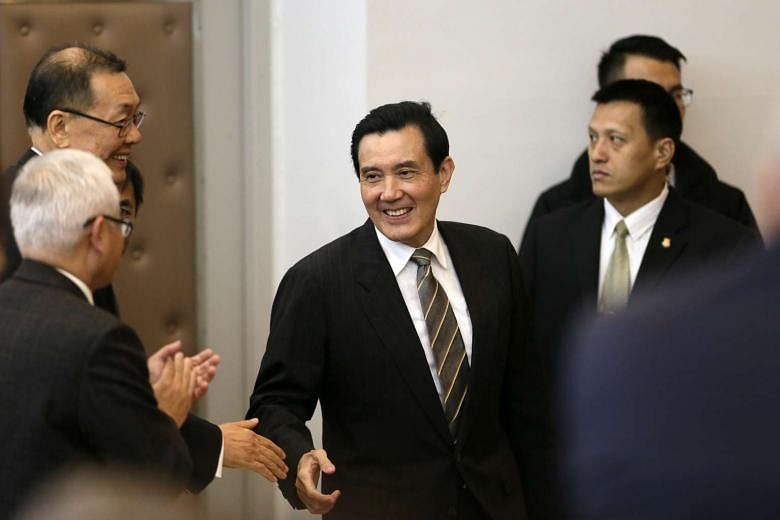TAIPEI (REUTERS, AFP) - Taiwan President Ma Ying-jeou said on Thursday (Jan 28) that Taiwan shares the United States' goals for the disputed South China Sea and would aim for peace and not conflict.
Ma made the comments at a briefing following his first trip to the Taiwan-held island of Itu Aba, known in Taiwan as Taiping Island, to reaffirm Taipei's sovereignty over the outpost, ignoring criticism from Washington over the trip.
The one-day visit comes amid growing international concern over rising tensions in the South China Sea, especially in the wake of Beijing's rapid creation of seven man-made islands in the Spratly archipelago.
In a speech to personnel stationed on Itu Aba, Ma said the islands were "an inherent part of the Republic of China", using Taiwan's official title. "This is indisputable," he said.
Ma's trip comes as several other claimants have been beefing up their military presence in the disputed region. Beijing regards almost the whole of the South China Sea as its territory and other claimants have complained it is become increasingly aggressive in pressing its claim.
Ma, however, adopted a more conciliatory tone, calling for the setting aside of disputes and proposed joint exploration of natural resources the area is believed to harbour.
"To resolve disputes in the South China Sea, the ROC government will work to safeguard sovereignty, shelve disputes, pursue peace and reciprocity, and promote joint development," he said, using Taiwan's other name, the Republic of China.
Washington, which has said it does not want to see an escalation of tensions in the region, said Wednesday Ma's trip was "extremely unhelpful and does not contribute to the peaceful resolution of disputes in the South China Sea."
Vietnam also protested on Thursday. "We resolutely oppose President Ma's action of going to Itu Aba," Tran Duy Hai, representative of the Vietnam Economic and Cultural Office in Taipei, told AFP. "The situation is already very tense. Each country shouldn't take any unilateral action. His action doesn't contribute to stability in the region."
The Philippines also warned Taiwan not to increase tensions in the disputed waters. "We remind all parties concerned of our shared responsibility to refrain from actions that can increase tension in the South China Sea," foreign ministry spokesman Charles Jose said.
China, which also regards Taiwan as part of its territory awaiting reunification, gave a measured response to Ma's trip. "The Nansha (Spratly) islands have been Chinese territory since ancient times. The Chinese people on both sides of the Taiwan Strait all have the responsibility to safeguard the ancestral property of the Chinese nation," Chinese foreign ministry spokeswoman Hua Chunying told reporters.
Both Taiwan and China claim most of the South China Sea. Vietnam, the Philippines, Malaysia and Brunei also have competing claims.
Taiwan has just finished a US$100 million (S$143 million) port upgrade and built a new lighthouse on Itu Aba. The island, which lies in the Spratlys, also has an airstrip, a hospital and fresh water.
Ma's office on Wednesday said the president, who steps down in May, would offer Chinese New Year wishes to residents on Itu Aba, mainly Taiwanese coastguard personnel and environmental scholars.
"This is an exercise in national sovereignty, full of legitimacy and necessity," Taiwan's Foreign Ministry said in a statement.
Given the tensions over the South China Sea, few senior political officials from any of the claimants have visited the contested region in recent years.
Ma's visit follows elections won by the independence-leaning Democratic Progressive Party (DPP), which declined a request by Ma to send a representative along. The DPP said Taiwan had a responsibility to maintain peace and stability in the area.
The claims of both China and Taiwan are based on maps from the late 1940s belonging to the Nationalists, when they ruled all of China. The Nationalists fled to Taiwan in 1949 after losing the Chinese civil war to Mao Zedong's Communists.
China has appeared unfazed by Taiwan's upgrading work on Itu Aba. Military strategists say that is because Itu Aba could fall into China's hands should it ever take over Taiwan, which it deems a wayward province to be retaken by force if necessary.
The 46-hectare island supports around 180 people, about 150 of them coastguard personnel.

